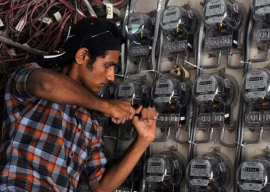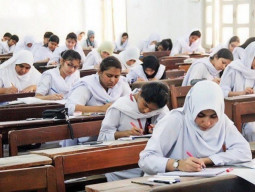
Named after a short story by Russian author Maxim Gorky, the session was moderated by author and political commentator Dr Rasul Baksh Rais, who spent more than 15 minutes with the introduction and presenting the first question to the panel of Naheed Azfar, Zobaida Jalal and Yaqoob Bangash.
Jalal, who was the education minister during Pervez Musharraf’s tenure, focused more on personal accounts for her answers. Her answers therefore drew on the Makran region, where she comes from, and even when it came to discussing civil society, she chose to mention the construction of a school by her family and how Balochistan focused more on community-based organisation.
Naheed Azfar’s talk on the other hand was more focused on the cultural side of the province, differences in dress, jewellry and a personal account of Baloch hospitality, which left a section of the audience clapping and cheering. This obviously wasn’t very interesting for Bangash, who was seen yawning on stage during one of her answers.
As it turned out, Yaqoob Bangash was a lot more engaging and interesting than the other two panellists - he did exactly what he was good at: give a history lesson to the audience. Perhaps if the organisers had chosen Bangash to moderate the session, it would have gone differently.
His ‘lesson’ focused more on the history of British Balochistan, the state of Kalat and Baloch tribes existing in both Balochistan and Sindh (mention of the Zardari tribe also being Baloch had Jalal smirking on stage).
Bangash said that it was important to understand the diversity of the province and engage with it, a creation of a state that can hold together. “The reason we don’t understand Balochistan is because we don’t understand what is going on there.”
He was quick to point out that the problem lay with not honouring the Baloch. “You have to engage and honour them, admit past mistakes and tell them that we want you to remain with Pakistan… they will get on board.” Thus, the Baloch will become a part of a national discourse if they are given the opportunity. Probably the most interesting part of the session was not Bangash’s history lesson, but an angry gentleman from the audience who pointed out that the historian was wrong in presenting the geographical history of the province and that the people who knew Balochistan were not being given their rights. The gentleman also directed his ‘mild rage’ towards Jalal, stating that language was a cultural expression of the province and she had not even given its people the right to learn in their mother tongue during her tenure.
Published in The Express Tribune, February 13th, 2012.
COMMENTS (3)
Comments are moderated and generally will be posted if they are on-topic and not abusive.
For more information, please see our Comments FAQ


1725443747-0/Untitled-design-(5)1725443747-0-165x106.webp)














Grace, in which era you are living. Baluchistan is the most backward Provence. Baluchi as a local language should be taught to preserve Baluch culture and heritage, but for progress I will still prefer national and international languages. The bottom line is to educate the people in any language, this is foremost important.The people of Baluchistan can then decide the language needed for their development and progress. They have to come out of tribal and feudal bondage.
@anwar jawaid: I disagree with you. I think Mr. Bangash is right about needing to empower Baluch more. Moreover we all know that the landed aristocracy in Sind is originally Baluch so why should it be a surprise to remind folks that the Zardari are actually a Baluch tribe? As for Baluchi as a language, it deserves state patronage as a national language of Pakistan and I agree with the gentleman who says the Baluch language should be taught there more.
Mr. Bangash I think you are Wrong: If you want to go ahead you should learn in a National language, so that you come at pars with others, and better still is National + International languages. This will give fast forward to Baluchistan.They need to be educated and Ms. Jalal was doing just that.